SM6064 Globalisation and Media: Dependency and Cultural Imperialism
VerifiedAdded on 2023/06/18
|9
|3249
|60
Essay
AI Summary
This essay provides a comprehensive analysis of dependency and cultural imperialism theories, examining their relevance in the context of globalization. It critically evaluates these theories by considering various factors and perspectives, including the critiques from other authors. The essay also explores the impact of China's investment on global dependency, assessing whether it has reduced or increased dependency levels. Furthermore, it delves into China's growing influence in regions like Africa, providing specific examples to illustrate the dynamics of this influence. The discussion encompasses the historical context of dependency, the role of media in cultural imperialism, and the complexities of international trade relations, highlighting the interconnectedness of economic, cultural, and political factors in the global landscape. Desklib offers a platform to explore similar solved assignments and past papers.
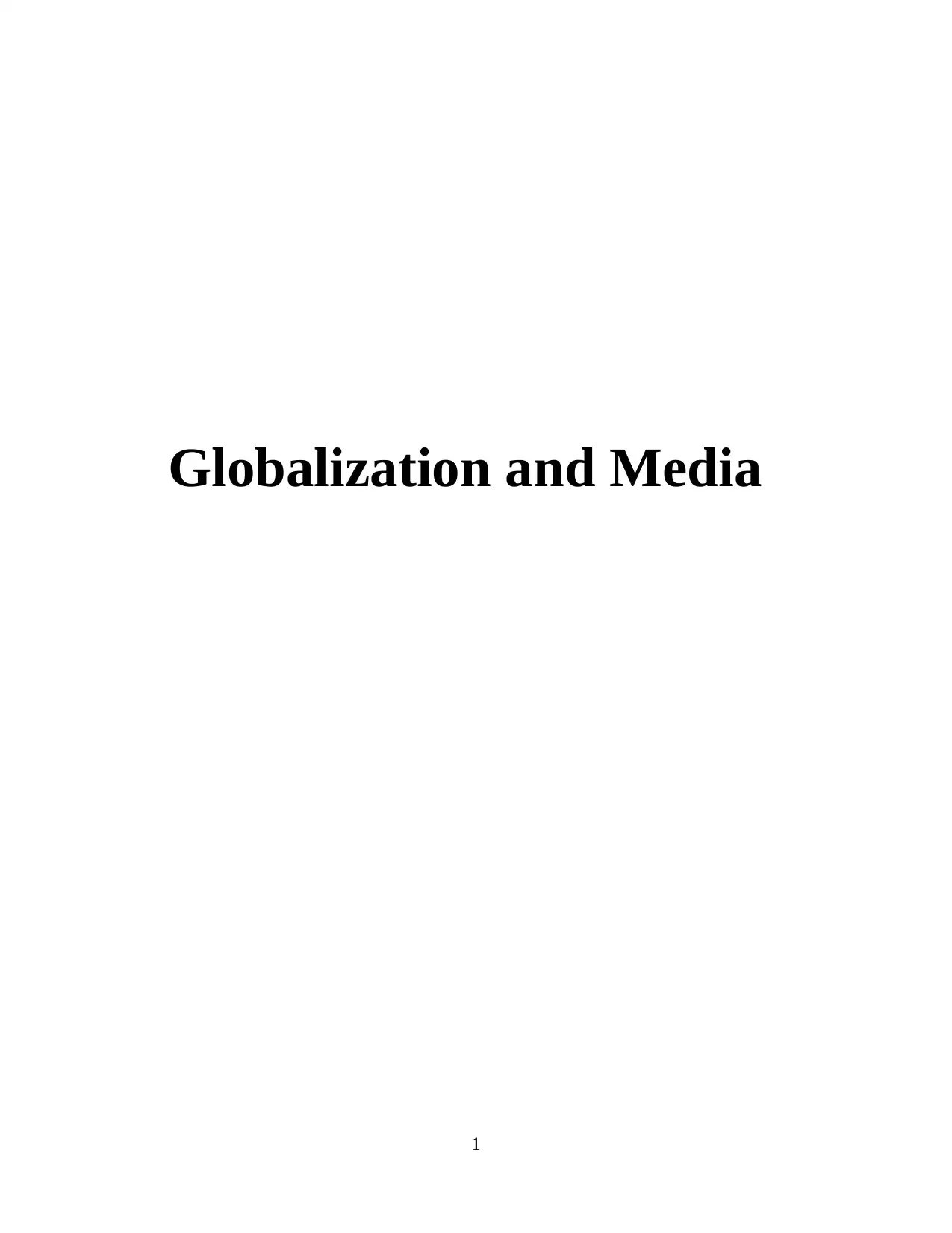
Globalization and Media
1
1
Paraphrase This Document
Need a fresh take? Get an instant paraphrase of this document with our AI Paraphraser
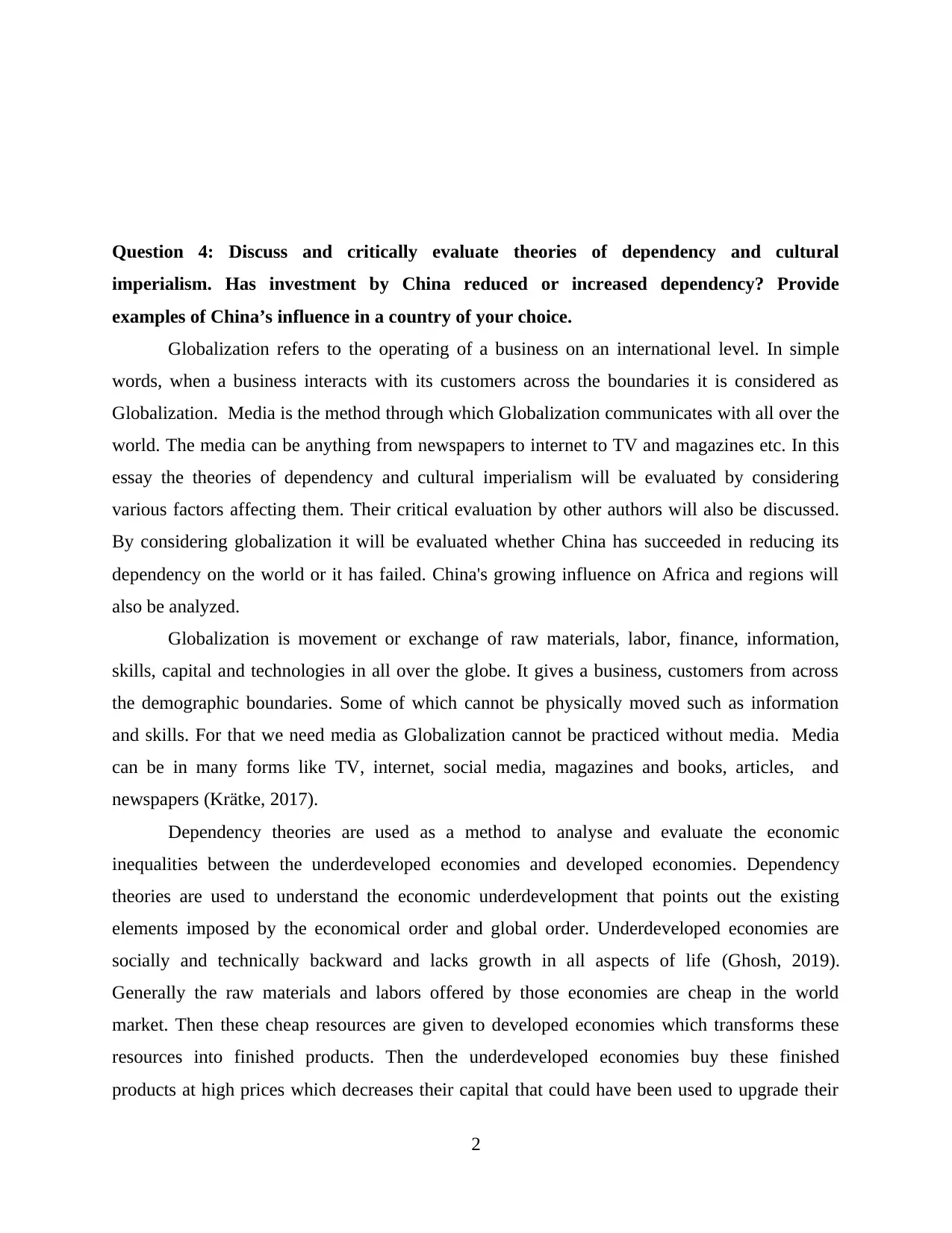
Question 4: Discuss and critically evaluate theories of dependency and cultural
imperialism. Has investment by China reduced or increased dependency? Provide
examples of China’s influence in a country of your choice.
Globalization refers to the operating of a business on an international level. In simple
words, when a business interacts with its customers across the boundaries it is considered as
Globalization. Media is the method through which Globalization communicates with all over the
world. The media can be anything from newspapers to internet to TV and magazines etc. In this
essay the theories of dependency and cultural imperialism will be evaluated by considering
various factors affecting them. Their critical evaluation by other authors will also be discussed.
By considering globalization it will be evaluated whether China has succeeded in reducing its
dependency on the world or it has failed. China's growing influence on Africa and regions will
also be analyzed.
Globalization is movement or exchange of raw materials, labor, finance, information,
skills, capital and technologies in all over the globe. It gives a business, customers from across
the demographic boundaries. Some of which cannot be physically moved such as information
and skills. For that we need media as Globalization cannot be practiced without media. Media
can be in many forms like TV, internet, social media, magazines and books, articles, and
newspapers (Krätke, 2017).
Dependency theories are used as a method to analyse and evaluate the economic
inequalities between the underdeveloped economies and developed economies. Dependency
theories are used to understand the economic underdevelopment that points out the existing
elements imposed by the economical order and global order. Underdeveloped economies are
socially and technically backward and lacks growth in all aspects of life (Ghosh, 2019).
Generally the raw materials and labors offered by those economies are cheap in the world
market. Then these cheap resources are given to developed economies which transforms these
resources into finished products. Then the underdeveloped economies buy these finished
products at high prices which decreases their capital that could have been used to upgrade their
2
imperialism. Has investment by China reduced or increased dependency? Provide
examples of China’s influence in a country of your choice.
Globalization refers to the operating of a business on an international level. In simple
words, when a business interacts with its customers across the boundaries it is considered as
Globalization. Media is the method through which Globalization communicates with all over the
world. The media can be anything from newspapers to internet to TV and magazines etc. In this
essay the theories of dependency and cultural imperialism will be evaluated by considering
various factors affecting them. Their critical evaluation by other authors will also be discussed.
By considering globalization it will be evaluated whether China has succeeded in reducing its
dependency on the world or it has failed. China's growing influence on Africa and regions will
also be analyzed.
Globalization is movement or exchange of raw materials, labor, finance, information,
skills, capital and technologies in all over the globe. It gives a business, customers from across
the demographic boundaries. Some of which cannot be physically moved such as information
and skills. For that we need media as Globalization cannot be practiced without media. Media
can be in many forms like TV, internet, social media, magazines and books, articles, and
newspapers (Krätke, 2017).
Dependency theories are used as a method to analyse and evaluate the economic
inequalities between the underdeveloped economies and developed economies. Dependency
theories are used to understand the economic underdevelopment that points out the existing
elements imposed by the economical order and global order. Underdeveloped economies are
socially and technically backward and lacks growth in all aspects of life (Ghosh, 2019).
Generally the raw materials and labors offered by those economies are cheap in the world
market. Then these cheap resources are given to developed economies which transforms these
resources into finished products. Then the underdeveloped economies buy these finished
products at high prices which decreases their capital that could have been used to upgrade their
2
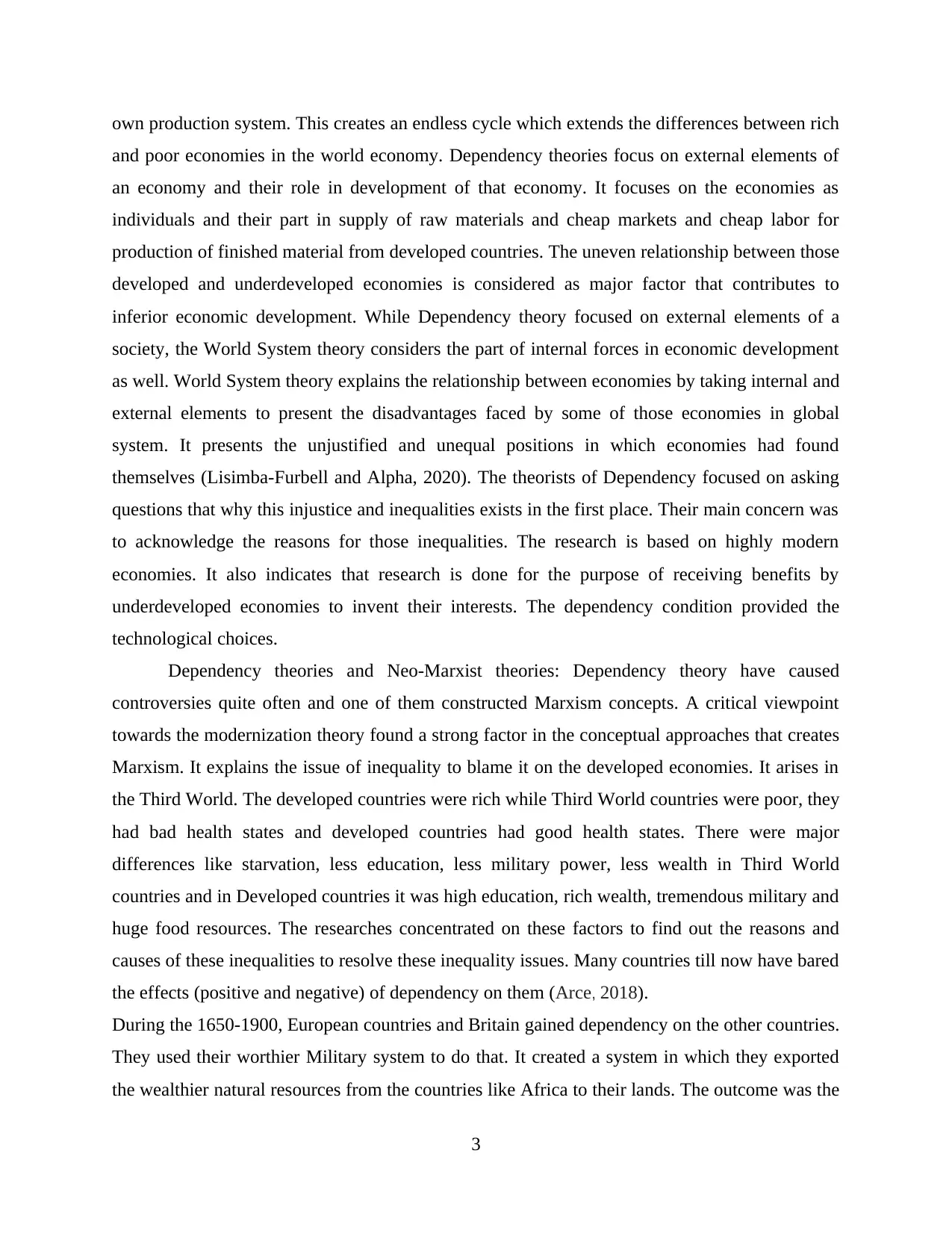
own production system. This creates an endless cycle which extends the differences between rich
and poor economies in the world economy. Dependency theories focus on external elements of
an economy and their role in development of that economy. It focuses on the economies as
individuals and their part in supply of raw materials and cheap markets and cheap labor for
production of finished material from developed countries. The uneven relationship between those
developed and underdeveloped economies is considered as major factor that contributes to
inferior economic development. While Dependency theory focused on external elements of a
society, the World System theory considers the part of internal forces in economic development
as well. World System theory explains the relationship between economies by taking internal and
external elements to present the disadvantages faced by some of those economies in global
system. It presents the unjustified and unequal positions in which economies had found
themselves (Lisimba-Furbell and Alpha, 2020). The theorists of Dependency focused on asking
questions that why this injustice and inequalities exists in the first place. Their main concern was
to acknowledge the reasons for those inequalities. The research is based on highly modern
economies. It also indicates that research is done for the purpose of receiving benefits by
underdeveloped economies to invent their interests. The dependency condition provided the
technological choices.
Dependency theories and Neo-Marxist theories: Dependency theory have caused
controversies quite often and one of them constructed Marxism concepts. A critical viewpoint
towards the modernization theory found a strong factor in the conceptual approaches that creates
Marxism. It explains the issue of inequality to blame it on the developed economies. It arises in
the Third World. The developed countries were rich while Third World countries were poor, they
had bad health states and developed countries had good health states. There were major
differences like starvation, less education, less military power, less wealth in Third World
countries and in Developed countries it was high education, rich wealth, tremendous military and
huge food resources. The researches concentrated on these factors to find out the reasons and
causes of these inequalities to resolve these inequality issues. Many countries till now have bared
the effects (positive and negative) of dependency on them (Arce, 2018).
During the 1650-1900, European countries and Britain gained dependency on the other countries.
They used their worthier Military system to do that. It created a system in which they exported
the wealthier natural resources from the countries like Africa to their lands. The outcome was the
3
and poor economies in the world economy. Dependency theories focus on external elements of
an economy and their role in development of that economy. It focuses on the economies as
individuals and their part in supply of raw materials and cheap markets and cheap labor for
production of finished material from developed countries. The uneven relationship between those
developed and underdeveloped economies is considered as major factor that contributes to
inferior economic development. While Dependency theory focused on external elements of a
society, the World System theory considers the part of internal forces in economic development
as well. World System theory explains the relationship between economies by taking internal and
external elements to present the disadvantages faced by some of those economies in global
system. It presents the unjustified and unequal positions in which economies had found
themselves (Lisimba-Furbell and Alpha, 2020). The theorists of Dependency focused on asking
questions that why this injustice and inequalities exists in the first place. Their main concern was
to acknowledge the reasons for those inequalities. The research is based on highly modern
economies. It also indicates that research is done for the purpose of receiving benefits by
underdeveloped economies to invent their interests. The dependency condition provided the
technological choices.
Dependency theories and Neo-Marxist theories: Dependency theory have caused
controversies quite often and one of them constructed Marxism concepts. A critical viewpoint
towards the modernization theory found a strong factor in the conceptual approaches that creates
Marxism. It explains the issue of inequality to blame it on the developed economies. It arises in
the Third World. The developed countries were rich while Third World countries were poor, they
had bad health states and developed countries had good health states. There were major
differences like starvation, less education, less military power, less wealth in Third World
countries and in Developed countries it was high education, rich wealth, tremendous military and
huge food resources. The researches concentrated on these factors to find out the reasons and
causes of these inequalities to resolve these inequality issues. Many countries till now have bared
the effects (positive and negative) of dependency on them (Arce, 2018).
During the 1650-1900, European countries and Britain gained dependency on the other countries.
They used their worthier Military system to do that. It created a system in which they exported
the wealthier natural resources from the countries like Africa to their lands. The outcome was the
3
⊘ This is a preview!⊘
Do you want full access?
Subscribe today to unlock all pages.

Trusted by 1+ million students worldwide
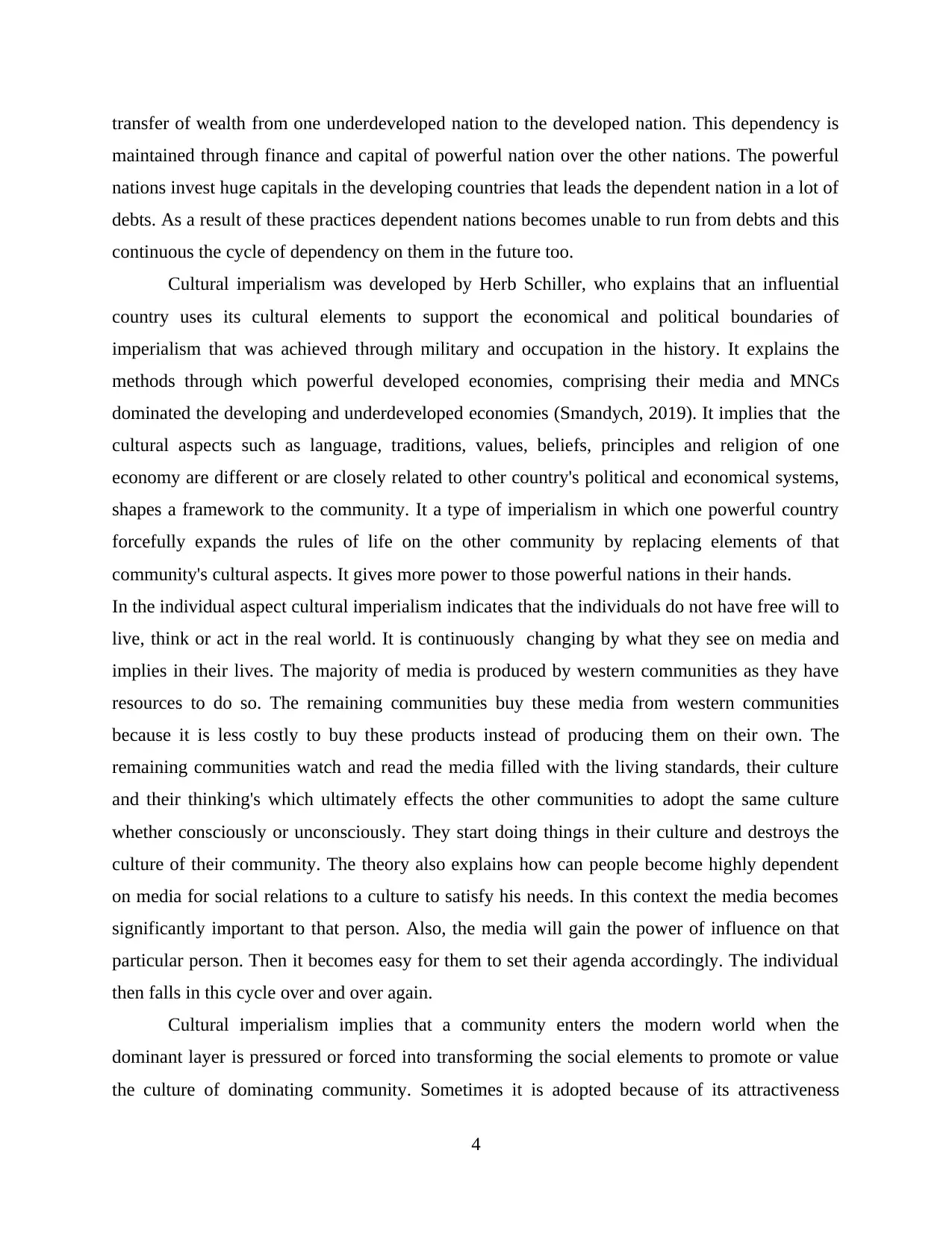
transfer of wealth from one underdeveloped nation to the developed nation. This dependency is
maintained through finance and capital of powerful nation over the other nations. The powerful
nations invest huge capitals in the developing countries that leads the dependent nation in a lot of
debts. As a result of these practices dependent nations becomes unable to run from debts and this
continuous the cycle of dependency on them in the future too.
Cultural imperialism was developed by Herb Schiller, who explains that an influential
country uses its cultural elements to support the economical and political boundaries of
imperialism that was achieved through military and occupation in the history. It explains the
methods through which powerful developed economies, comprising their media and MNCs
dominated the developing and underdeveloped economies (Smandych, 2019). It implies that the
cultural aspects such as language, traditions, values, beliefs, principles and religion of one
economy are different or are closely related to other country's political and economical systems,
shapes a framework to the community. It a type of imperialism in which one powerful country
forcefully expands the rules of life on the other community by replacing elements of that
community's cultural aspects. It gives more power to those powerful nations in their hands.
In the individual aspect cultural imperialism indicates that the individuals do not have free will to
live, think or act in the real world. It is continuously changing by what they see on media and
implies in their lives. The majority of media is produced by western communities as they have
resources to do so. The remaining communities buy these media from western communities
because it is less costly to buy these products instead of producing them on their own. The
remaining communities watch and read the media filled with the living standards, their culture
and their thinking's which ultimately effects the other communities to adopt the same culture
whether consciously or unconsciously. They start doing things in their culture and destroys the
culture of their community. The theory also explains how can people become highly dependent
on media for social relations to a culture to satisfy his needs. In this context the media becomes
significantly important to that person. Also, the media will gain the power of influence on that
particular person. Then it becomes easy for them to set their agenda accordingly. The individual
then falls in this cycle over and over again.
Cultural imperialism implies that a community enters the modern world when the
dominant layer is pressured or forced into transforming the social elements to promote or value
the culture of dominating community. Sometimes it is adopted because of its attractiveness
4
maintained through finance and capital of powerful nation over the other nations. The powerful
nations invest huge capitals in the developing countries that leads the dependent nation in a lot of
debts. As a result of these practices dependent nations becomes unable to run from debts and this
continuous the cycle of dependency on them in the future too.
Cultural imperialism was developed by Herb Schiller, who explains that an influential
country uses its cultural elements to support the economical and political boundaries of
imperialism that was achieved through military and occupation in the history. It explains the
methods through which powerful developed economies, comprising their media and MNCs
dominated the developing and underdeveloped economies (Smandych, 2019). It implies that the
cultural aspects such as language, traditions, values, beliefs, principles and religion of one
economy are different or are closely related to other country's political and economical systems,
shapes a framework to the community. It a type of imperialism in which one powerful country
forcefully expands the rules of life on the other community by replacing elements of that
community's cultural aspects. It gives more power to those powerful nations in their hands.
In the individual aspect cultural imperialism indicates that the individuals do not have free will to
live, think or act in the real world. It is continuously changing by what they see on media and
implies in their lives. The majority of media is produced by western communities as they have
resources to do so. The remaining communities buy these media from western communities
because it is less costly to buy these products instead of producing them on their own. The
remaining communities watch and read the media filled with the living standards, their culture
and their thinking's which ultimately effects the other communities to adopt the same culture
whether consciously or unconsciously. They start doing things in their culture and destroys the
culture of their community. The theory also explains how can people become highly dependent
on media for social relations to a culture to satisfy his needs. In this context the media becomes
significantly important to that person. Also, the media will gain the power of influence on that
particular person. Then it becomes easy for them to set their agenda accordingly. The individual
then falls in this cycle over and over again.
Cultural imperialism implies that a community enters the modern world when the
dominant layer is pressured or forced into transforming the social elements to promote or value
the culture of dominating community. Sometimes it is adopted because of its attractiveness
4
Paraphrase This Document
Need a fresh take? Get an instant paraphrase of this document with our AI Paraphraser
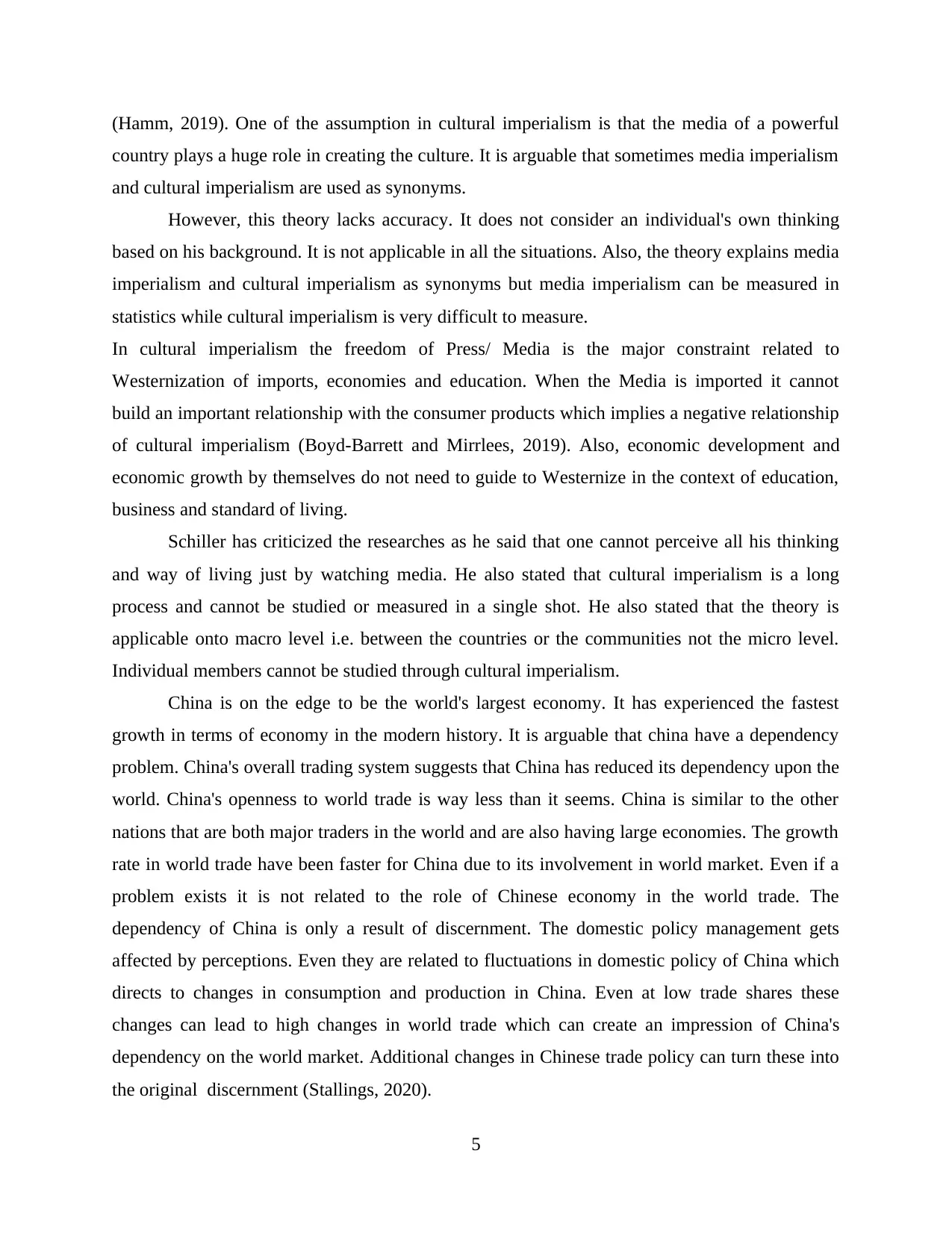
(Hamm, 2019). One of the assumption in cultural imperialism is that the media of a powerful
country plays a huge role in creating the culture. It is arguable that sometimes media imperialism
and cultural imperialism are used as synonyms.
However, this theory lacks accuracy. It does not consider an individual's own thinking
based on his background. It is not applicable in all the situations. Also, the theory explains media
imperialism and cultural imperialism as synonyms but media imperialism can be measured in
statistics while cultural imperialism is very difficult to measure.
In cultural imperialism the freedom of Press/ Media is the major constraint related to
Westernization of imports, economies and education. When the Media is imported it cannot
build an important relationship with the consumer products which implies a negative relationship
of cultural imperialism (Boyd-Barrett and Mirrlees, 2019). Also, economic development and
economic growth by themselves do not need to guide to Westernize in the context of education,
business and standard of living.
Schiller has criticized the researches as he said that one cannot perceive all his thinking
and way of living just by watching media. He also stated that cultural imperialism is a long
process and cannot be studied or measured in a single shot. He also stated that the theory is
applicable onto macro level i.e. between the countries or the communities not the micro level.
Individual members cannot be studied through cultural imperialism.
China is on the edge to be the world's largest economy. It has experienced the fastest
growth in terms of economy in the modern history. It is arguable that china have a dependency
problem. China's overall trading system suggests that China has reduced its dependency upon the
world. China's openness to world trade is way less than it seems. China is similar to the other
nations that are both major traders in the world and are also having large economies. The growth
rate in world trade have been faster for China due to its involvement in world market. Even if a
problem exists it is not related to the role of Chinese economy in the world trade. The
dependency of China is only a result of discernment. The domestic policy management gets
affected by perceptions. Even they are related to fluctuations in domestic policy of China which
directs to changes in consumption and production in China. Even at low trade shares these
changes can lead to high changes in world trade which can create an impression of China's
dependency on the world market. Additional changes in Chinese trade policy can turn these into
the original discernment (Stallings, 2020).
5
country plays a huge role in creating the culture. It is arguable that sometimes media imperialism
and cultural imperialism are used as synonyms.
However, this theory lacks accuracy. It does not consider an individual's own thinking
based on his background. It is not applicable in all the situations. Also, the theory explains media
imperialism and cultural imperialism as synonyms but media imperialism can be measured in
statistics while cultural imperialism is very difficult to measure.
In cultural imperialism the freedom of Press/ Media is the major constraint related to
Westernization of imports, economies and education. When the Media is imported it cannot
build an important relationship with the consumer products which implies a negative relationship
of cultural imperialism (Boyd-Barrett and Mirrlees, 2019). Also, economic development and
economic growth by themselves do not need to guide to Westernize in the context of education,
business and standard of living.
Schiller has criticized the researches as he said that one cannot perceive all his thinking
and way of living just by watching media. He also stated that cultural imperialism is a long
process and cannot be studied or measured in a single shot. He also stated that the theory is
applicable onto macro level i.e. between the countries or the communities not the micro level.
Individual members cannot be studied through cultural imperialism.
China is on the edge to be the world's largest economy. It has experienced the fastest
growth in terms of economy in the modern history. It is arguable that china have a dependency
problem. China's overall trading system suggests that China has reduced its dependency upon the
world. China's openness to world trade is way less than it seems. China is similar to the other
nations that are both major traders in the world and are also having large economies. The growth
rate in world trade have been faster for China due to its involvement in world market. Even if a
problem exists it is not related to the role of Chinese economy in the world trade. The
dependency of China is only a result of discernment. The domestic policy management gets
affected by perceptions. Even they are related to fluctuations in domestic policy of China which
directs to changes in consumption and production in China. Even at low trade shares these
changes can lead to high changes in world trade which can create an impression of China's
dependency on the world market. Additional changes in Chinese trade policy can turn these into
the original discernment (Stallings, 2020).
5
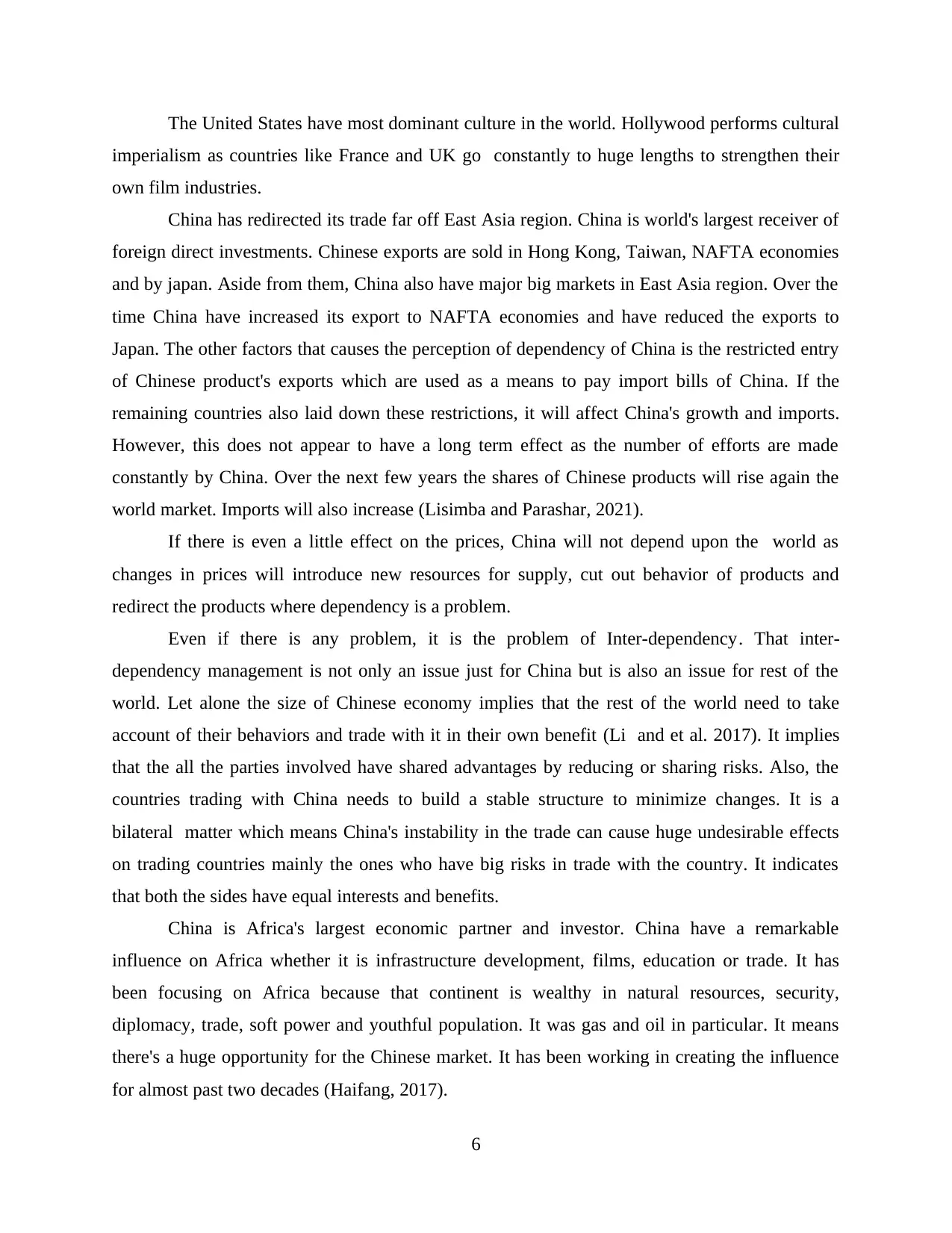
The United States have most dominant culture in the world. Hollywood performs cultural
imperialism as countries like France and UK go constantly to huge lengths to strengthen their
own film industries.
China has redirected its trade far off East Asia region. China is world's largest receiver of
foreign direct investments. Chinese exports are sold in Hong Kong, Taiwan, NAFTA economies
and by japan. Aside from them, China also have major big markets in East Asia region. Over the
time China have increased its export to NAFTA economies and have reduced the exports to
Japan. The other factors that causes the perception of dependency of China is the restricted entry
of Chinese product's exports which are used as a means to pay import bills of China. If the
remaining countries also laid down these restrictions, it will affect China's growth and imports.
However, this does not appear to have a long term effect as the number of efforts are made
constantly by China. Over the next few years the shares of Chinese products will rise again the
world market. Imports will also increase (Lisimba and Parashar, 2021).
If there is even a little effect on the prices, China will not depend upon the world as
changes in prices will introduce new resources for supply, cut out behavior of products and
redirect the products where dependency is a problem.
Even if there is any problem, it is the problem of Inter-dependency. That inter-
dependency management is not only an issue just for China but is also an issue for rest of the
world. Let alone the size of Chinese economy implies that the rest of the world need to take
account of their behaviors and trade with it in their own benefit (Li and et al. 2017). It implies
that the all the parties involved have shared advantages by reducing or sharing risks. Also, the
countries trading with China needs to build a stable structure to minimize changes. It is a
bilateral matter which means China's instability in the trade can cause huge undesirable effects
on trading countries mainly the ones who have big risks in trade with the country. It indicates
that both the sides have equal interests and benefits.
China is Africa's largest economic partner and investor. China have a remarkable
influence on Africa whether it is infrastructure development, films, education or trade. It has
been focusing on Africa because that continent is wealthy in natural resources, security,
diplomacy, trade, soft power and youthful population. It was gas and oil in particular. It means
there's a huge opportunity for the Chinese market. It has been working in creating the influence
for almost past two decades (Haifang, 2017).
6
imperialism as countries like France and UK go constantly to huge lengths to strengthen their
own film industries.
China has redirected its trade far off East Asia region. China is world's largest receiver of
foreign direct investments. Chinese exports are sold in Hong Kong, Taiwan, NAFTA economies
and by japan. Aside from them, China also have major big markets in East Asia region. Over the
time China have increased its export to NAFTA economies and have reduced the exports to
Japan. The other factors that causes the perception of dependency of China is the restricted entry
of Chinese product's exports which are used as a means to pay import bills of China. If the
remaining countries also laid down these restrictions, it will affect China's growth and imports.
However, this does not appear to have a long term effect as the number of efforts are made
constantly by China. Over the next few years the shares of Chinese products will rise again the
world market. Imports will also increase (Lisimba and Parashar, 2021).
If there is even a little effect on the prices, China will not depend upon the world as
changes in prices will introduce new resources for supply, cut out behavior of products and
redirect the products where dependency is a problem.
Even if there is any problem, it is the problem of Inter-dependency. That inter-
dependency management is not only an issue just for China but is also an issue for rest of the
world. Let alone the size of Chinese economy implies that the rest of the world need to take
account of their behaviors and trade with it in their own benefit (Li and et al. 2017). It implies
that the all the parties involved have shared advantages by reducing or sharing risks. Also, the
countries trading with China needs to build a stable structure to minimize changes. It is a
bilateral matter which means China's instability in the trade can cause huge undesirable effects
on trading countries mainly the ones who have big risks in trade with the country. It indicates
that both the sides have equal interests and benefits.
China is Africa's largest economic partner and investor. China have a remarkable
influence on Africa whether it is infrastructure development, films, education or trade. It has
been focusing on Africa because that continent is wealthy in natural resources, security,
diplomacy, trade, soft power and youthful population. It was gas and oil in particular. It means
there's a huge opportunity for the Chinese market. It has been working in creating the influence
for almost past two decades (Haifang, 2017).
6
⊘ This is a preview!⊘
Do you want full access?
Subscribe today to unlock all pages.

Trusted by 1+ million students worldwide
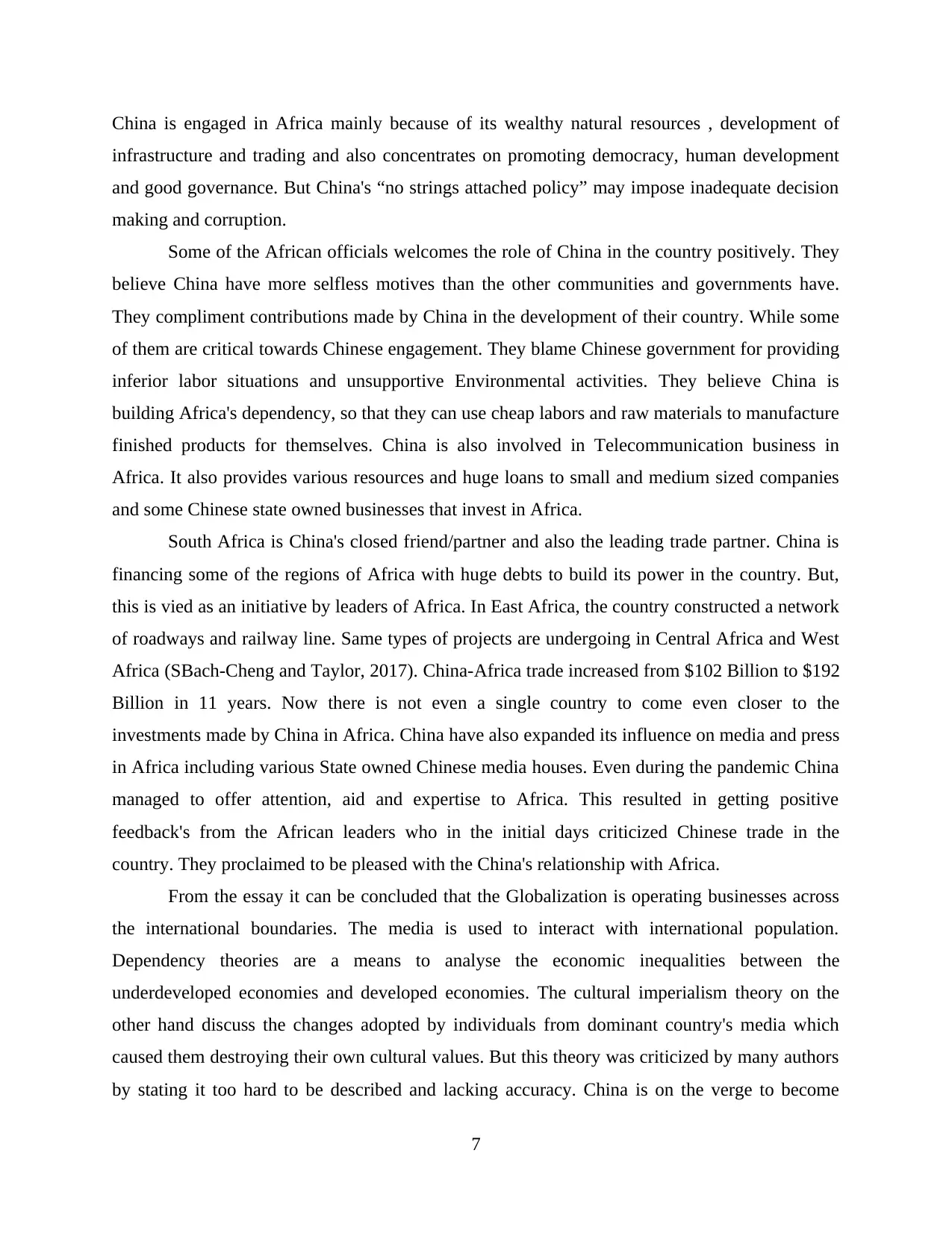
China is engaged in Africa mainly because of its wealthy natural resources , development of
infrastructure and trading and also concentrates on promoting democracy, human development
and good governance. But China's “no strings attached policy” may impose inadequate decision
making and corruption.
Some of the African officials welcomes the role of China in the country positively. They
believe China have more selfless motives than the other communities and governments have.
They compliment contributions made by China in the development of their country. While some
of them are critical towards Chinese engagement. They blame Chinese government for providing
inferior labor situations and unsupportive Environmental activities. They believe China is
building Africa's dependency, so that they can use cheap labors and raw materials to manufacture
finished products for themselves. China is also involved in Telecommunication business in
Africa. It also provides various resources and huge loans to small and medium sized companies
and some Chinese state owned businesses that invest in Africa.
South Africa is China's closed friend/partner and also the leading trade partner. China is
financing some of the regions of Africa with huge debts to build its power in the country. But,
this is vied as an initiative by leaders of Africa. In East Africa, the country constructed a network
of roadways and railway line. Same types of projects are undergoing in Central Africa and West
Africa (SBach-Cheng and Taylor, 2017). China-Africa trade increased from $102 Billion to $192
Billion in 11 years. Now there is not even a single country to come even closer to the
investments made by China in Africa. China have also expanded its influence on media and press
in Africa including various State owned Chinese media houses. Even during the pandemic China
managed to offer attention, aid and expertise to Africa. This resulted in getting positive
feedback's from the African leaders who in the initial days criticized Chinese trade in the
country. They proclaimed to be pleased with the China's relationship with Africa.
From the essay it can be concluded that the Globalization is operating businesses across
the international boundaries. The media is used to interact with international population.
Dependency theories are a means to analyse the economic inequalities between the
underdeveloped economies and developed economies. The cultural imperialism theory on the
other hand discuss the changes adopted by individuals from dominant country's media which
caused them destroying their own cultural values. But this theory was criticized by many authors
by stating it too hard to be described and lacking accuracy. China is on the verge to become
7
infrastructure and trading and also concentrates on promoting democracy, human development
and good governance. But China's “no strings attached policy” may impose inadequate decision
making and corruption.
Some of the African officials welcomes the role of China in the country positively. They
believe China have more selfless motives than the other communities and governments have.
They compliment contributions made by China in the development of their country. While some
of them are critical towards Chinese engagement. They blame Chinese government for providing
inferior labor situations and unsupportive Environmental activities. They believe China is
building Africa's dependency, so that they can use cheap labors and raw materials to manufacture
finished products for themselves. China is also involved in Telecommunication business in
Africa. It also provides various resources and huge loans to small and medium sized companies
and some Chinese state owned businesses that invest in Africa.
South Africa is China's closed friend/partner and also the leading trade partner. China is
financing some of the regions of Africa with huge debts to build its power in the country. But,
this is vied as an initiative by leaders of Africa. In East Africa, the country constructed a network
of roadways and railway line. Same types of projects are undergoing in Central Africa and West
Africa (SBach-Cheng and Taylor, 2017). China-Africa trade increased from $102 Billion to $192
Billion in 11 years. Now there is not even a single country to come even closer to the
investments made by China in Africa. China have also expanded its influence on media and press
in Africa including various State owned Chinese media houses. Even during the pandemic China
managed to offer attention, aid and expertise to Africa. This resulted in getting positive
feedback's from the African leaders who in the initial days criticized Chinese trade in the
country. They proclaimed to be pleased with the China's relationship with Africa.
From the essay it can be concluded that the Globalization is operating businesses across
the international boundaries. The media is used to interact with international population.
Dependency theories are a means to analyse the economic inequalities between the
underdeveloped economies and developed economies. The cultural imperialism theory on the
other hand discuss the changes adopted by individuals from dominant country's media which
caused them destroying their own cultural values. But this theory was criticized by many authors
by stating it too hard to be described and lacking accuracy. China is on the verge to become
7
Paraphrase This Document
Need a fresh take? Get an instant paraphrase of this document with our AI Paraphraser
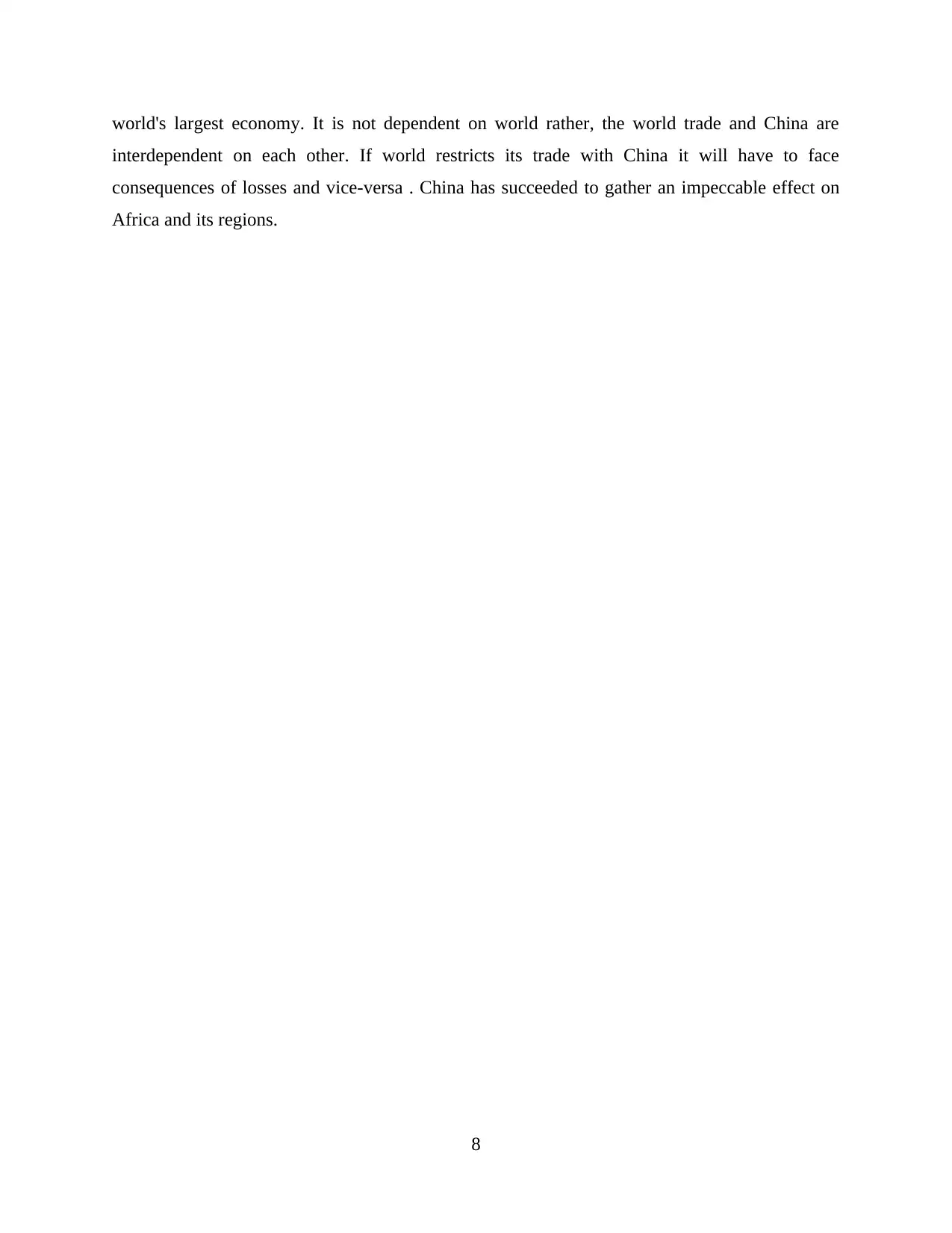
world's largest economy. It is not dependent on world rather, the world trade and China are
interdependent on each other. If world restricts its trade with China it will have to face
consequences of losses and vice-versa . China has succeeded to gather an impeccable effect on
Africa and its regions.
8
interdependent on each other. If world restricts its trade with China it will have to face
consequences of losses and vice-versa . China has succeeded to gather an impeccable effect on
Africa and its regions.
8
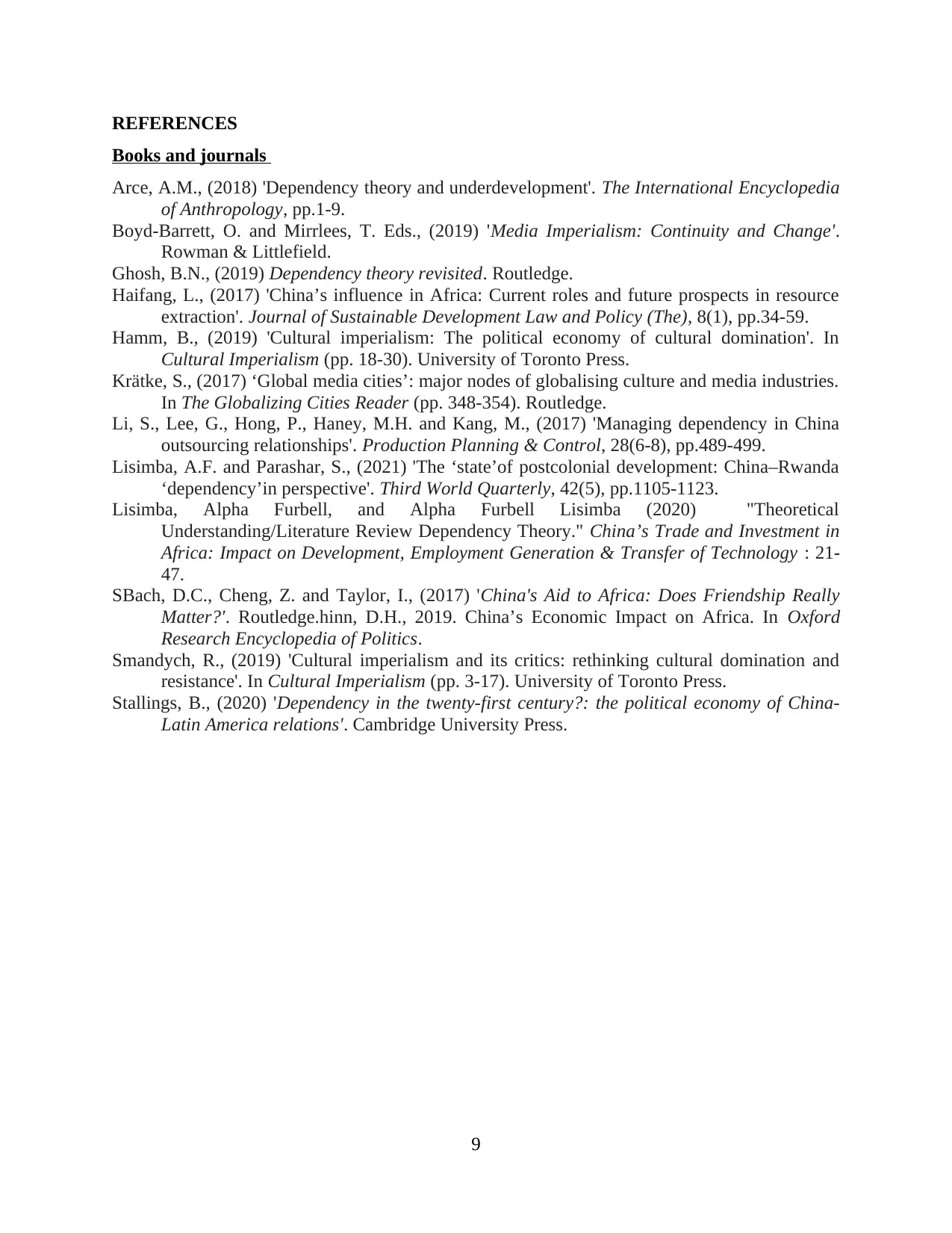
REFERENCES
Books and journals
Arce, A.M., (2018) 'Dependency theory and underdevelopment'. The International Encyclopedia
of Anthropology, pp.1-9.
Boyd-Barrett, O. and Mirrlees, T. Eds., (2019) 'Media Imperialism: Continuity and Change'.
Rowman & Littlefield.
Ghosh, B.N., (2019) Dependency theory revisited. Routledge.
Haifang, L., (2017) 'China’s influence in Africa: Current roles and future prospects in resource
extraction'. Journal of Sustainable Development Law and Policy (The), 8(1), pp.34-59.
Hamm, B., (2019) 'Cultural imperialism: The political economy of cultural domination'. In
Cultural Imperialism (pp. 18-30). University of Toronto Press.
Krätke, S., (2017) ‘Global media cities’: major nodes of globalising culture and media industries.
In The Globalizing Cities Reader (pp. 348-354). Routledge.
Li, S., Lee, G., Hong, P., Haney, M.H. and Kang, M., (2017) 'Managing dependency in China
outsourcing relationships'. Production Planning & Control, 28(6-8), pp.489-499.
Lisimba, A.F. and Parashar, S., (2021) 'The ‘state’of postcolonial development: China–Rwanda
‘dependency’in perspective'. Third World Quarterly, 42(5), pp.1105-1123.
Lisimba, Alpha Furbell, and Alpha Furbell Lisimba (2020) "Theoretical
Understanding/Literature Review Dependency Theory." China’s Trade and Investment in
Africa: Impact on Development, Employment Generation & Transfer of Technology : 21-
47.
SBach, D.C., Cheng, Z. and Taylor, I., (2017) 'China's Aid to Africa: Does Friendship Really
Matter?'. Routledge.hinn, D.H., 2019. China’s Economic Impact on Africa. In Oxford
Research Encyclopedia of Politics.
Smandych, R., (2019) 'Cultural imperialism and its critics: rethinking cultural domination and
resistance'. In Cultural Imperialism (pp. 3-17). University of Toronto Press.
Stallings, B., (2020) 'Dependency in the twenty-first century?: the political economy of China-
Latin America relations'. Cambridge University Press.
9
Books and journals
Arce, A.M., (2018) 'Dependency theory and underdevelopment'. The International Encyclopedia
of Anthropology, pp.1-9.
Boyd-Barrett, O. and Mirrlees, T. Eds., (2019) 'Media Imperialism: Continuity and Change'.
Rowman & Littlefield.
Ghosh, B.N., (2019) Dependency theory revisited. Routledge.
Haifang, L., (2017) 'China’s influence in Africa: Current roles and future prospects in resource
extraction'. Journal of Sustainable Development Law and Policy (The), 8(1), pp.34-59.
Hamm, B., (2019) 'Cultural imperialism: The political economy of cultural domination'. In
Cultural Imperialism (pp. 18-30). University of Toronto Press.
Krätke, S., (2017) ‘Global media cities’: major nodes of globalising culture and media industries.
In The Globalizing Cities Reader (pp. 348-354). Routledge.
Li, S., Lee, G., Hong, P., Haney, M.H. and Kang, M., (2017) 'Managing dependency in China
outsourcing relationships'. Production Planning & Control, 28(6-8), pp.489-499.
Lisimba, A.F. and Parashar, S., (2021) 'The ‘state’of postcolonial development: China–Rwanda
‘dependency’in perspective'. Third World Quarterly, 42(5), pp.1105-1123.
Lisimba, Alpha Furbell, and Alpha Furbell Lisimba (2020) "Theoretical
Understanding/Literature Review Dependency Theory." China’s Trade and Investment in
Africa: Impact on Development, Employment Generation & Transfer of Technology : 21-
47.
SBach, D.C., Cheng, Z. and Taylor, I., (2017) 'China's Aid to Africa: Does Friendship Really
Matter?'. Routledge.hinn, D.H., 2019. China’s Economic Impact on Africa. In Oxford
Research Encyclopedia of Politics.
Smandych, R., (2019) 'Cultural imperialism and its critics: rethinking cultural domination and
resistance'. In Cultural Imperialism (pp. 3-17). University of Toronto Press.
Stallings, B., (2020) 'Dependency in the twenty-first century?: the political economy of China-
Latin America relations'. Cambridge University Press.
9
⊘ This is a preview!⊘
Do you want full access?
Subscribe today to unlock all pages.

Trusted by 1+ million students worldwide
1 out of 9
Related Documents
Your All-in-One AI-Powered Toolkit for Academic Success.
+13062052269
info@desklib.com
Available 24*7 on WhatsApp / Email
![[object Object]](/_next/static/media/star-bottom.7253800d.svg)
Unlock your academic potential
Copyright © 2020–2026 A2Z Services. All Rights Reserved. Developed and managed by ZUCOL.





